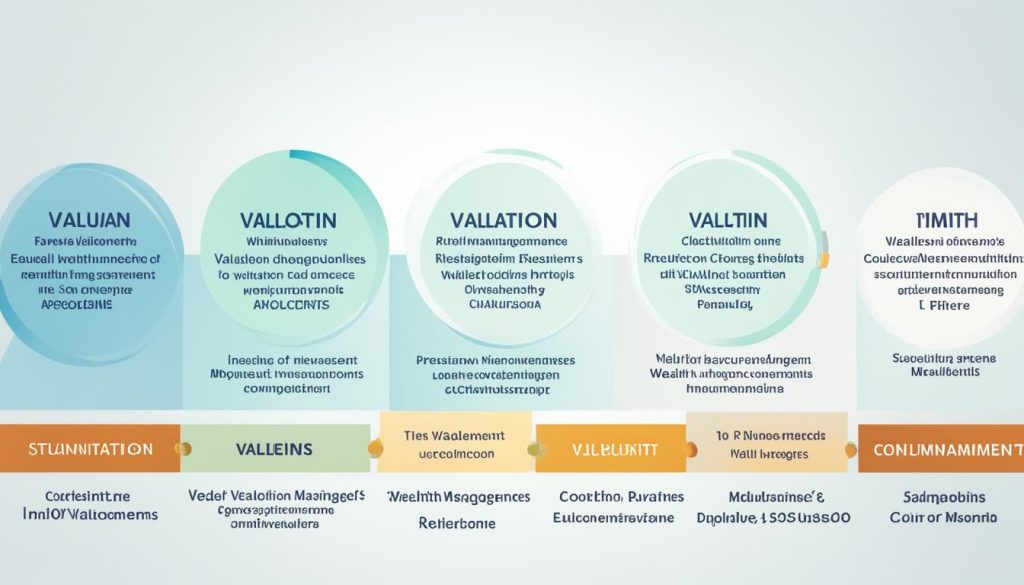When it comes to valuing a wealth management firm, there are crucial factors and methodologies to consider. The value of such a firm is not absolute but rather relative, dependent on various contexts such as the purpose of the transaction, the specific firm being valued, and the current state of the wealth management industry. It’s essential to avoid oversimplifying this process with rules of thumb like “2% of AUM”. The wealth management industry is both mature and dynamic, with the rise of registered investment advisors (RIAs) and the increasing demand for a fiduciary standard fueling specialization.
A multitude of factors can influence the valuation of wealth management firms. Fee pressure, technological advancements, demographics, and scale are just a few examples of elements that impact the assessment of these firms’ worth. Understanding the wealth management business model is key to accurately valuing these entities. Unlike pure investment management, wealth management encompasses relationship management and wealth planning. The revenue streams of wealth management firms, whether derived from fees, commissions, or a combination of both, are critical factors that shape their valuation.
Key Takeaways:
- Valuing a wealth management firm requires considering various factors and methodologies
- Simplistic rules of thumb are insufficient for accurate valuation
- Fee pressure, technology, demographics, and scale impact valuation
- Wealth management involves relationship management and wealth planning
- Revenue streams through fees, commissions, or both are crucial for valuation
Understanding the Wealth Management Business Model
Wealth management firms specialize in managing investible assets, such as various types of securities, commodities, real estate, and other alternative investments. Unlike pure investment management, wealth management goes beyond solely managing investments. It also involves relationship management and wealth planning, providing clients with a holistic approach to their financial goals and objectives.
One of the key components of the wealth management business model is relationship management. Wealth managers cultivate long-term relationships with their clients, taking the time to understand their needs, objectives, and risk tolerance. This personalized approach allows wealth managers to develop tailored investment strategies and provide ongoing support and guidance.
Wealth planning is another integral part of the business model. Wealth managers help clients navigate complex financial decisions, such as retirement planning, tax optimization, estate planning, and intergenerational wealth transfer. By providing comprehensive wealth planning services, wealth management firms aim to help clients preserve and grow their wealth over the long term.
The revenue streams of wealth management firms can be based on fees, commissions, or a combination of both. These revenue streams are essential considerations in valuing a wealth management firm. The quality and predictability of the revenue streams play a crucial role in determining the firm’s value, as they directly impact its profitability and sustainability.
The book of business, type of clients, and the direction of assets under management (AUM) growth are also important factors to consider in valuing a wealth management business. A well-diversified and growing client base, coupled with consistent AUM growth, can contribute to the firm’s overall value and attractiveness to potential investors or acquirers.
Furthermore, the alignment of investment philosophy between the wealth management firm and its clients is crucial. Clients’ trust and confidence in the firm’s investment approach and strategies directly influence their decision to remain with or engage the services of the firm. Therefore, a strong alignment of investment philosophies can increase both client retention and the firm’s value.
Valuation Methods for Wealth Management Firms
When valuing a wealth management firm, there are several methods to consider, each providing unique insights into its worth. Two common valuation methods are private market value (PMV) based on EBITDA multiple and recurring revenue. Another method is the use of asset under management (AUM) multiples. The choice of valuation method depends on the specific purpose and the buyer’s perspective.
The PMV approach involves considering various factors, such as the strategic buyer’s considerations or the cash-on-cash returns for investors. This method provides a comprehensive understanding of the firm’s value based on its financial performance and growth potential.
For a going concern wealth management business, general guidelines for valuation can include using revenue multiples, cash flow multiples, asset multiples, or market approaches, which involve comparing the firm’s financials to similar publicly-traded companies.
The size of the firm and the quality of its revenue streams can significantly impact the valuation. A larger firm with a strong recurring revenue base and stable AUM growth may command a higher valuation range. Conversely, a smaller firm with less predictable revenue may be valued differently.
Private Market Value (PMV) Approach
The PMV approach takes into consideration the unique perspectives of strategic buyers and investors, allowing for a comprehensive assessment of the firm’s worth. Factors such as market demand, growth projections, competitive advantage, and operational efficiency are all considered when determining the private market value.
Revenue and Cash Flow Multiples
Valuing a wealth management firm using revenue multiples or cash flow multiples involves determining the firm’s value based on its financial metrics. Multiples are calculated by comparing the revenue or cash flow of the target firm to similar firms in the market. This approach provides insights into the firm’s financial performance and potential profitability.
Market Approach
The market approach involves comparing the financial metrics of a wealth management firm to similar publicly-traded companies. This approach provides insights into how the market values firms with similar characteristics. By analyzing the multiples and performance metrics of comparable companies, a valuation range can be determined.
Overall, the valuation methods for wealth management firms provide a comprehensive understanding of the firm’s worth, taking into account factors such as financial performance, growth potential, and market dynamics. By considering different valuation methods, investors and buyers can make informed decisions based on a holistic assessment of the firm’s value.

Factors Affecting the Valuation of Wealth Management Businesses
Valuing a wealth management firm involves considering numerous factors that can impact its overall worth. These factors play a crucial role in determining the attractiveness, profitability, and sustainability of the business. Understanding and analyzing these factors is essential for investors and business owners looking to evaluate the value of a wealth management firm.
- Terms of Payment: The terms of payment in acquiring a wealth management firm can vary, including options like all-cash payments or deferred payments.
- Compensation Model: The compensation model of a wealth management firm, whether fee-based, commission-based, or including performance bonuses, can influence its valuation.
- Type of Clients: The portfolio of clients that a wealth management firm serves can impact its valuation. Firms with high-net-worth clients or a diverse client base may be perceived as more valuable.
- Direction of AUM Growth: The direction of assets under management (AUM) growth can affect the valuation of a wealth management firm. Positive AUM growth indicates a thriving business and may increase its value.
- Investment Philosophy Alignment: The alignment of the wealth management firm’s investment philosophy with market trends and client needs can contribute to its valuation.
- Business Development Strategies: The effectiveness of a firm’s business development strategies, including marketing and client acquisition efforts, can influence its overall value.
- Personnel: The experience, expertise, and track record of the firm’s personnel, such as the financial advisors and management team, can affect its valuation.
- Succession Plan: Having a well-defined succession plan in place can enhance the value of a wealth management firm, as it demonstrates long-term stability and continuity.
- Value Added Services: Offering value-added services, such as comprehensive financial planning, estate planning, tax advisory, or specialized investment strategies, can contribute to a higher valuation.
- Account Custody: The arrangements for account custody, including partnerships with reputable custodians, can influence the valuation by instilling confidence in clients and investors.
Considering these factors along with other industry-specific metrics and market conditions is vital to accurately assessing the value of a wealth management business. Each factor contributes to the overall picture and helps investors and business owners make informed decisions regarding acquisitions, mergers, or the evaluation of their own firms.

Key Insights from Recent Wealth Management Firm Valuations
Recent valuations of wealth management firms have provided valuable insights into the factors that drive the value of these businesses. Understanding these insights can help investors and business owners make informed decisions when it comes to acquiring or valuing wealth management firms.
One key insight that has emerged is the importance of business model fit. The alignment between the acquirer and the target firm’s business model can significantly impact the valuation. A well-aligned business model allows for a smoother integration process and enhances the potential for long-term success.

Eliminating risks, such as compliance-related liabilities, is another crucial factor in determining the value of a wealth management firm. The ability to effectively manage and mitigate risks can increase the overall valuation and attract potential buyers who prioritize risk reduction.
Cost and revenue synergies are also important considerations. We have observed that the ability to achieve cost and revenue synergies can significantly impact the valuation of a wealth management firm. These synergies arise from the combination of resources, expertise, and client base, leading to enhanced operational efficiency and revenue growth.
Furthermore, the availability of alternative sellers and the level of competition between buyers can influence the valuation of a wealth management firm. When multiple buyers are interested in acquiring a firm, the competitive bidding process can drive up the valuation. Similarly, the presence of alternative sellers can provide leverage to potential buyers, affecting the final valuation.
Robust Sales Process and Thorough Analysis
A robust sales process is crucial in achieving the best possible value in a wealth management firm acquisition. A well-structured and transparent process ensures that all potential buyers have equal access to information and opportunities to present their offers. This not only maximizes the chances of securing a favorable deal but also enhances the overall perception of the firm’s value.
Successful recent valuations have also highlighted the importance of conducting a thorough analysis before making any decisions. Conducting comprehensive due diligence, evaluating the strengths and weaknesses of the target firm, and considering potential risks are essential steps to navigate the valuation process effectively. This analysis allows for a more accurate assessment of the firm’s value and mitigates potential surprises post-acquisition.
In conclusion, recent wealth management firm valuations have shed light on key insights that can shape investment decisions. The importance of business model fit, risk elimination, cost and revenue synergies, availability of alternative sellers, competition between buyers, and a robust sales process cannot be understated. By considering these insights and conducting a thorough analysis, investors and business owners can position themselves for success in the wealth management industry.
Exploring Valuation Multiples in the Wealth Management Sector
Valuation multiples play a significant role in the wealth management sector, contributing to the assessment of a firm’s worth. One commonly used valuation multiple is the EBITDA multiple, which provides insights into a company’s earnings potential. Recent data shows a wide range of EBITDA multiples in the wealth management sector, spanning from 3x to 27x, highlighting the variability in valuations.
The size of a wealth management firm can have an impact on its valuation, but it should not be considered the sole determinant. Other factors such as business model differences, risk considerations, and market conditions can also greatly influence the valuation of a firm. A thorough understanding of these factors is crucial for accurately assessing the value of a wealth management business.
Business model differences can significantly affect valuation multiples. Factors such as the firm’s revenue streams, fee structure, client base, and investment strategies can all contribute to variations in valuation. It is important to consider how these differences align with the current market demands and dynamics.
Risk considerations are another essential factor in establishing valuation multiples. Investors and acquirers assess the risk profile of a wealth management firm, evaluating potential liabilities, compliance issues, and operational risks. Mitigating these risks can contribute to a higher valuation, while unaddressed risks may lead to a lower valuation.
Market conditions also play a crucial role. The overall market environment can impact the demand for wealth management services and the availability of potential buyers. In a competitive market, valuations may be driven higher due to the scarcity value, while a market with economic uncertainties may result in lower valuations.
Furthermore, pricing errors should be avoided during the valuation process. Miscalculating financial metrics, misinterpreting market data, or neglecting key variables can lead to inaccurate valuations. Conducting thorough due diligence and relying on expert advice can help minimize pricing errors and ensure a fair valuation.
Considering all these factors and understanding the intricacies of valuation multiples is essential for anyone involved in valuing a wealth management firm. By carefully assessing the size impact, business model differences, risk considerations, market conditions, and avoiding pricing errors, investors and business owners can derive an accurate and fair valuation for a wealth management business.

Key Takeaways:
- Valuation multiples in the wealth management sector can vary significantly, with EBITDA multiples being commonly used.
- Size is not the sole determinant of valuation, and factors such as business model differences, risk considerations, and market conditions also play crucial roles.
- Understanding the impact of business model differences, risk considerations, and market conditions is essential for accurate valuations.
- Avoiding pricing errors and ensuring fair valuation requires thorough due diligence and expert advice.
Conclusion
Valuing a wealth management firm involves careful consideration of strategic factors and specific valuation considerations. The context in which the valuation takes place, such as the transactional purpose and the state of the wealth management industry, can greatly influence the expected returns on investment. Additionally, factors like the compensation model, type of clients, direction of assets under management (AUM) growth, personnel, succession plan, and value-added services all play a significant role in determining the firm’s valuation.
By understanding recent valuations, valuation multiples, and key insights from the industry, investors and business owners can make more informed decisions. These insights help stakeholders navigate the valuation process effectively and strategically. It is crucial to consider all the aforementioned factors to accurately determine the value of a wealth management firm.
Overall, the valuation of a wealth management firm requires a comprehensive assessment of the strategic factors involved and specific valuation considerations. This understanding, along with the aforementioned key takeaways, empowers investors and business owners to make informed decisions and achieve their desired outcome.




No comments! Be the first commenter?